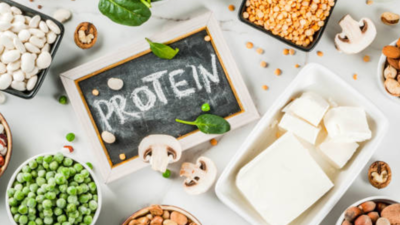
The best time of day to eat protein depends on individual health goals, lifestyle, and daily schedule. Protein plays a crucial role in muscle repair, hormone production, and overall energy. When consumed strategically, protein intake can maximize benefits such as muscle growth, fat loss, and sustained energy levels.
Here’s a breakdown of optimal times to consume protein and why each may be beneficial.
Protein in the morning
Consuming protein at breakfast can offer a multitude of benefits, especially in terms of sustained energy and controlled hunger. Protein takes much longer to digest than carbohydrates, so its energy is released steadily into the body without triggering hunger pangs. High-protein foods in the breakfast can further reduce one’s appetite for other foods and control blood sugar, which is crucial to those who need to maintain weight or avoid crashing energy.

Studies show that a high-protein breakfast may reduce cravings for unhealthy snacks later in the day. Additionally, protein-rich breakfasts have been associated with improved focus, making this timing ideal for people with busy mornings or those needing concentration for work or study.
Eating protein before workout
Consumption of dietary protein prior to exercise provides amino acids that can be utilized by the muscles during intense exercise. Such amino acids can potentially minimize muscle protein breakdown and assist the body in preparing for faster recovery. A protein-rich food or drink that is consumed one to two hours before exercise like a protein shake or yogurt can help provide the body with a mix of fuel for the muscles and assist in providing energy during a workout. The intake of protein in combination with a moderate amount of complex carbohydrates, such as oats or whole-grain toast, can further enhance endurance.
For those focused on muscle gain, eating protein pre-workout may also help stimulate muscle protein synthesis during exercise. This approach can benefit athletes, bodybuilders, and anyone looking to enhance muscle strength or tone.
Having protein after workout
Many fitness experts emphasize post-workout protein consumption as essential for muscle repair and growth. During exercise, muscle fibers experience small tears, and protein is needed to repair and build stronger fibers. The “anabolic window”—the period immediately after a workout—was once thought to be 30 minutes, but recent research suggests it may extend to several hours. However, consuming protein within an hour post-workout is still recommended for optimal results.
How to find the right protein powder: Expert explains in 10 points
Post-workout protein intake replenishes amino acids in the muscles and supports recovery. Fast-digesting proteins, like whey protein, or a meal containing lean meat or fish, are particularly effective during this time. This approach is beneficial for athletes or those with an intense exercise routine focused on muscle growth.
Protein during dinner
For some, consuming protein before bed, especially a slow-digesting protein like casein (found in dairy), may benefit muscle recovery overnight. During sleep, the body repairs tissues, including muscles, and having protein in the bloodstream supports this natural recovery process. Research suggests that casein protein can provide a sustained release of amino acids, helping to prevent muscle breakdown overnight.
This strategy can be helpful for athletes, older adults, or those focused on muscle growth. Studies have shown that consuming protein before bed does not lead to weight gain if within daily caloric needs and may even support metabolism.
Distribute your protein intake throughout the day
For overall health and balanced metabolism, distributing protein intake evenly across meals can be effective. Research suggests that consuming protein consistently throughout the day, rather than in one large meal, may lead to better muscle synthesis. This practice can prevent muscle loss, especially as we age, and support lean muscle maintenance.
Eating protein-rich foods in every meal also keeps you feeling fuller for longer, aiding in weight management. Some ideal sources include eggs or tofu in the morning, beans or chicken at lunch, and fish or legumes for dinner. This balanced approach works well for those with a sedentary lifestyle or those aiming to maintain general fitness without a heavy workout regimen.

